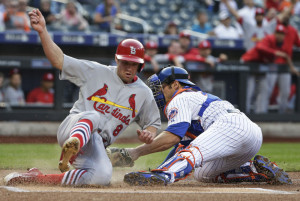If you follow baseball, you’re probably at least decently aware that both the American and National leagues have three divisions each; this has been the way of baseball since 1994. And winning the division has always meant a ticket into the playoffs. But, inevitably, as is the case with the NFL and just about every other major sport, some divisions are evidently better than others.
This year, the best division in the majors has been, by a wide margin, the NL Central. It’s about to field three playoff teams (Cardinals, Pirates, Cubs) and each one of those three teams is at least 20 games over .500. The three playoff teams in the Central also happen to be the three best teams in the NL. However, with the way the playoff structure works, the Pirates and Cubs will be subjected to a one-game playoff to decide which one advances to the division series. The worst part? The winner of this game is going to have to play the Cardinals, the best team in the game and a potential 100-game winner.
So even though the Pirates and Cubbies are the second and third best teams in the NL by record, one of them will be left out of the senior circuit’s final four. But two of the teams that will be one of the last four standing in the NL will be the NL West champ (either the Dodgers or Giants) and the NL East winner (most likely the Mets). Both teams currently sit at 67-56, a whole 4.5 games worse than the Cubs.
Hypothetically, let’s just say that the Pirates win the Wild Card game. In this case, the Buccos would be forced to play the Cardinals in a match-up of the NL’s two best teams record-wise. One of them would be eliminated in this series. The winner would then play the winner of the Mets-Dodgers series (that’s what we’ll call it for the sake of this discussion).
So, here’s what would happen under the current format: two of the three best teams in the NL would be out before the League Championship Series. Does this sound like a fair way to decide a champion? I don’t think so. We could be left with a very interesting LCS matchup (the Mets and Dodgers are two of the most dangerous teams in baseball if they make the playoffs) but the system won’t reward the most successful regular season teams.
So I came up with a very simple way to fix the big issue plaguing the MLB playoffs, the one in which the best teams knock each other out early in October. Here is my solution so that problem.
The Win-Loss Record, Stupid
I’m not calling anyone stupid; I just wanted to inject a little James Carville into this article to make it a tad more interesting. Anyway, let’s get back on track.
The way to fix this simple issue has everything to do with rewarding the teams with the best records in baseball. In my playoff format, I would disregard division winners and not automatically reward them with a reprieve from the Wild Card game. I would treat divisions as a way to geographically separate the teams as well as a process to solve tiebreakers. For example, if two teams had the same record, the first tiebreaker would be in-division records. I feel that it is a fair enough way to hash things out if two teams with the same record either get into the playoffs or are fighting for the last ticket to the dance.
So how would this seeding work? This is how.
- Best record
- Second-best record
- Third-best record
- Fourth-best record
- Fifth-best record
Not that much would really change from the format we have now. The only difference would be that seeding would be determined by record, not winning the division. Tiebreaker would be the aforementioned in-division record. And the four and five seeds would play in a one-game playoff, just like in the current system. It’s not perfect, but I believe that this is definitely better than having two of the three best teams knocked out of the postseason before the Championship Series.
So how would the playoff picture actually shake out using this method? Here are the playoff seedings for both leagues, sorted by win-loss record.
AL
- Kansas City Royals- 75-48
- Toronto Blue Jays- 69-55
- New York Yankees- 68-55
- Houston Astros- 69-56
- Texas Rangers- 64-59
NL
- St. Louis Cardinals- 78-45
- Pittsburgh Pirates- 74-48
- Chicago Cubs- 71-51
- New York Mets- 67-56
- Los Angeles Dodgers- 67-56
*Note: Mets win in-division record tiebreaker.
If you look closely at the teams in my playoffs, you’ll notice something: the teams that would make the postseason if the regular season ended today are the exact same teams that would make it in with the current system. I’m just rearranging the deck chairs, if you will, to reward the teams with better records.
And, this is just a personal aside, but I think the match-ups in this version of the playoffs would be more scintillating than they would be in real life. A one-game playoff between the Dodgers and Mets, along with a potential clash of Jacob deGrom and Zack Greinke, the two best pitchers in the game by ERA? Yes, please. An in-division meeting of the Yankees and Blue Jays? I’ll take that. And the potential of either another Dodgers-Cardinals meeting or a bout between the two best pitching staffs in baseball? That would be good. The possibilities are endless.
One More Note on How This Would Work
In my baseball, home-field advantage would not be decided by the All-Star game. I would decide my World Series home-field by regular season performance, but that leaves one small ambiguity to clear up. Hypothetically, let’s say the Cubs (the NL’s three-seed) and the Blue Jays (the AL’s two-seed) meet in the World Series. While the Blue Jays have the better seed, the Cubs have the better record (this is a general theme; the NL is better than the AL this year). This would leave a conundrum as to who would get home-field. Here is the answer, if I ruled baseball (imagine that for just a second):
The Chicago Cubs.
This is the fair way to conduct the World Series, and this is how home-field advantage would be decided; not by seeding or meaningless exhibition game, but by win-loss record. It’s consistent with the way the rest of these playoffs work: rewarding winners, regardless of what division they play in.
So, other than re-seeding, I’d keep the exact same playoff format. The Wild Card game is great, especially considering its urgency and random nature. It’s given us awesome:
And, at worst, talked about:
And the winner of my Wild Card game would play the one-seed, just like in the current format. Not much really changes.
So, making one little change to the way the Playoffs work would make a world of difference, in my opinion. It’s not some huge, earth-shattering change like getting rid of divisions all together, and because we are keeping the divisions, we can still have the same wild and crazy in-division rivalries that we do now.
So all this is is a very minor change to the system; some may argue otherwise, but I don’t think it’s a big deal. It rewards regular season performance while still giving an incentive to win inside the division. It’s the little change that can go a long way to fixing the problem with the MLB playoffs.
It’s the win-loss record, stupid.



